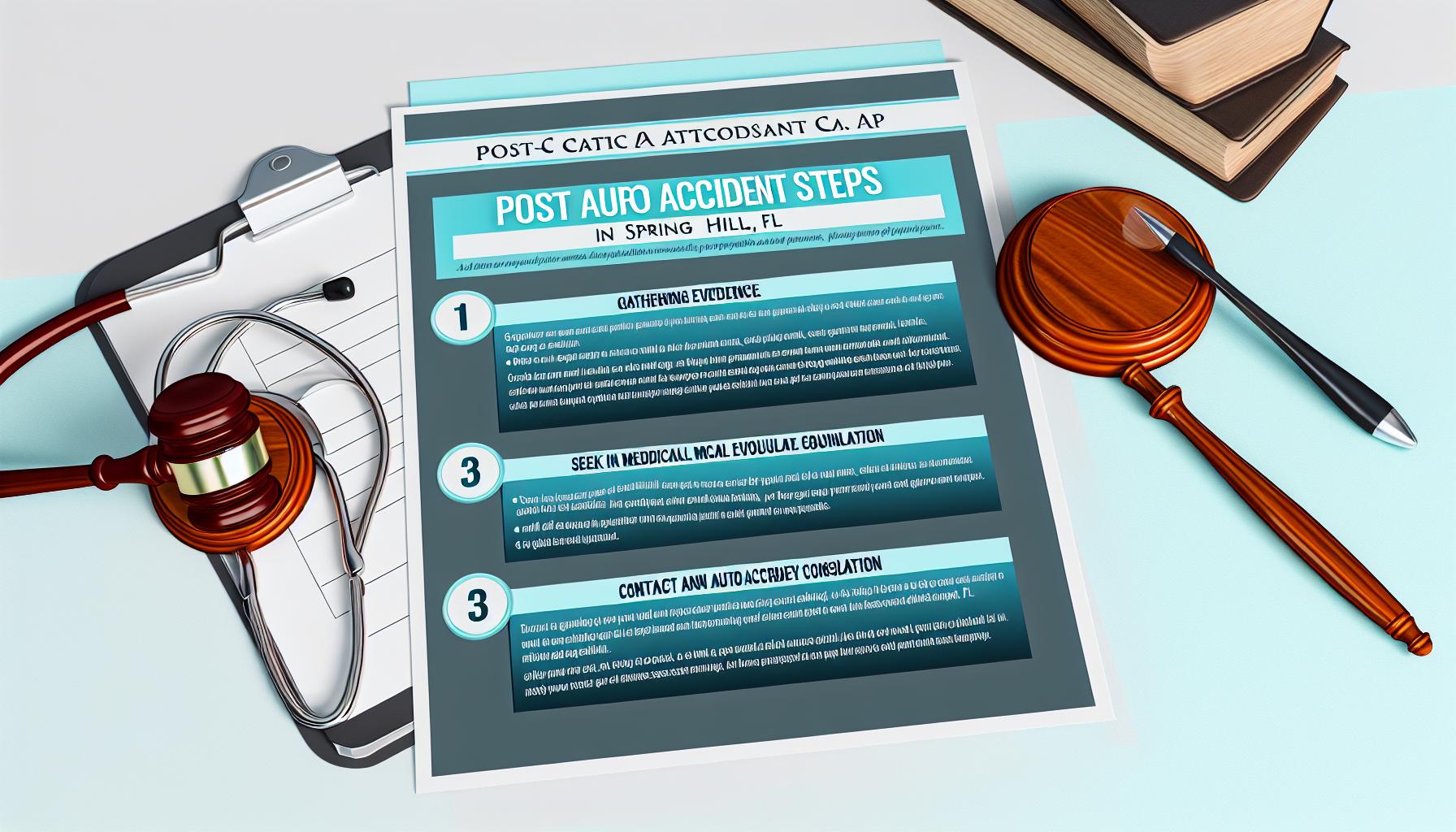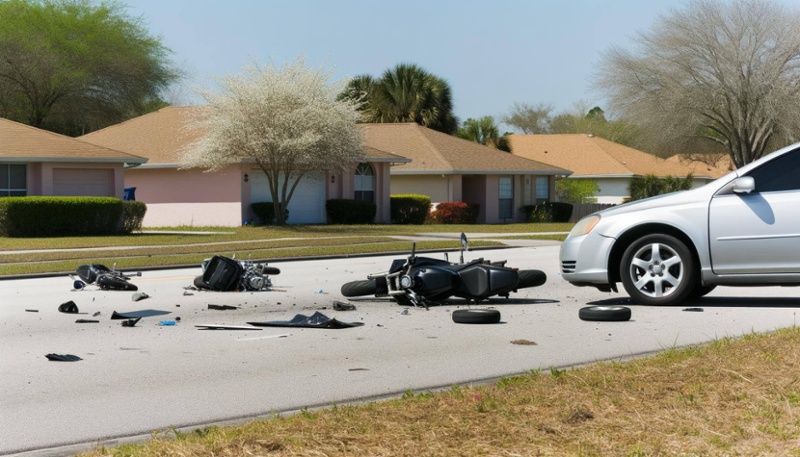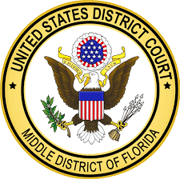What to do after being in a Car Accident in Spring Hill, FL?

Auto Accident Checklist for Car Accident Victims
As an auto accident attorney in Spring Hill, FL, our attorney has seen how traumatizing being involved in an auto accident can be. You, like most people, might be wondering who is going to pay for my car?; how can I tell who is at fault for having caused the accident?; do I need to see a doctor?; or should I call a lawyer? First, it’s important for you to realize that these questions are completely normal and expected; second, the car accident attorney at the Peck Law Firm P.A. has assembled a checklist of things that you can do after being involved in a car accident to ensure that you are prepared to file a claim with the at-fault driver’s insurance company and if needed, a lawsuit in the future.
1. Gather Evidence at the Scene of the Accident.
What many people do not understand is that strong car accident claims are often built by gathering hard evidence, meaning, evidence that is unbiased. The fact is, once you are involved in a car accident, your account of what happened is automatically going to be viewed by your insurance company and the other driver’s insurance company through a biased lense. Why? Because both of you have something to gain and lose based on who is found to be at fault and the extent to which each driver is found to be at fault for having caused the accident. If the other driver is found to be 100% liable for the accident, their insurance rates will undoubtedly go up. The same could be said for you as well. Thus, when insurance companies are evaluating claims, this fact is naturally taken into account.
What Evidence Should I Gather After Being Involved in an Auto Accident?
However, the more evidence, other than your recollection of how the accident occurred, that you can gather that supports your account of how the accident occurred, the stronger your claim will be. Consequently, you should always do the following if possible:
- Take pictures of the accident scene, including photos of the damage to both vehicles and any other relevant aspects of the scene, for example skid marks, road conditions, etc.
- Call the police and request that they complete an accident report. This will, at least, allow you to have a record of when the accident occurred, who the other driver is, where the accident occurred, etc.
- Look for and get the contact information of any person who may have witnessed the accident. A witness’ account of how the accident occurred can be an invaluable piece of evidence because the witness does not have a stake in the outcome of the liability determination. As such, a witness’ account of how the accident occurred will be taken as true in most instances, unless it is contradicted by other evidence.
- Survey the surrounding area for security cameras. Florida, as of 2018, is home to over 2.5 million small businesses according to the United States Small Business Association, and the trends among small businesses indicate that many either have invested or will invest in security cameras. As a result, the security cameras at many banks, businesses, and ATMs often will capture video footage of car accidents. Though it is true that this footage belongs to the business, copies of the footage can often be obtained simply by asking the business owner or manager for the footage or, in certain cases, by serving the business with a subpoena. So, it’s important that you survey the area where the accident occurred for businesses with security cameras that may have captured footage of the accident and communicate this information to your car accident attorney.
2. Get Evaluated by a Physician
After being involved in a car accident, you might be tempted to ask yourself, “Do I really need to get evaluated by a doctor if I’m not in any pain?” The short answer is, yes you should. And this is based on the fact that many people experience delayed symptoms after being involved in a car accident. In fact, according to an article published by Rush University, a medical school based out of Chicago, car accident victims with a whiplash injury may not experience symptoms for hours, days, or even weeks after the accident. This tends to be significant given that whiplash is commonly caused by car accidents according to National Institute of Health (NIH) and in some cases, can cause devastating symptoms such as memory loss, concentration impairment, nervousness/irritability, sleep disturbances, fatigue, depression, neck pain, neck stiffness, injuries to the muscles and ligaments (myofascial injuries), headaches, dizziness, abnormal sensations such as burning or prickling (paresthesias), or even shoulder or back pain.
Are There Any Legal Repercussions if I Don’t Get Evaluated by a Doctor?
Moreover, under Florida’s “14-Day Rule,” which can be found under Fla.Stat. § 627.736(a), auto accident victims have 14 days after being involved in a car accident to seek care under their Personal Injury Protection (PIP) insurance, or else, they run the risk of being denied PIP coverage by their own insurance carrier.
So, what does all this mean for you? Well, it means that: 1) even if you don’t feel like you have been injured in a car accident, you may still be injured and just haven’t experienced symptoms yet and 2) Florida law only gives you a limited amount of time to seek medical care under your PIP insurance after an accident, or you run the risk of having your claim denied. While it is true that even if your PIP claim is denied you may be able to recoup some of the costs associated with your medical care from the at-fault driver, it is not uncommon for at-fault drivers to either not have any insurance or be under insured, which simply means that the cost of compensating you for your injuries is higher that the at-fault driver’s policy limits. The moral of this information is that it is highly advisable for you to get evaluated by a doctor at some point within the two weeks following your accident, because at the very least, you can ensure that first, you are ok from a health perspective and second, that you can use your PIP insurance later on if other symptoms from injuries you unknowingly sustained in the accident manifest themselves.
3. Contact an Auto Accident Attorney for a Consultation
Many people often ask themselves, “Do I really need to get an attorney involved after a car accident?” The answer to this question varies on a case-by-case basis because whether you “need” a lawyer depends on a number of factors. But, from a legal perspective, there are some things that you should consider.
Why Car Accident Victim’s Need to Know About Florida’s Comparative Fault Rule
First, Florida is a “pure” comparative fault state. Fla.Stat. § 768.81 provides “[i]n a negligence action, contributory fault chargeable to the claimant diminishes proportionately the amount awarded as economic and noneconomic damages for an injury attributable to the claimant’s contributory fault, but does not bar recovery.” What this means is that the determination of who is “at fault” for having caused an accident is not an all or nothing determination. Rather, fault is allocated based on a percentage, and both drivers can be deemed to be partially at fault for having caused an accident. The meaning of “pure” comparative fault simply means that there is no cutoff on a litigants ability to sue the other diver, so even if you were found to be only 10% at fault for causing an accident, you could still be sued by the other driver, who was 90% at fault, for 10% of their damages. This particular rule can have serious consequences for the average driver due to the way that auto insurance interacts with the law.
How does Florida’s Comparative Fault Rule Work?
In most cases, an auto insurance carrier only has to pay up to the total amount of an insurance policy’s limits, so if you carry $10,000 in bodily injury coverage, the maximum amount that your insurance company will have to pay if you are found to be at fault for having caused an accident is $10,000 in bodily injury damages. However, the “pure” comparative fault rule can have some unintended consequences. For example, let’s say that you are involved in a car accident. You carry $100,000 worth of bodily injury coverage, and the other driver involved carries $10,000 worth of bodily injury coverage. You are found to be 10% at fault for causing the accident, and the other driver was found to be 90% at fault for having caused the accident. You have sustained serious injuries in the accident and incurred $50,000 in damages, but the other driver is relatively poor and is, therefore, judgment proof because even if you sued the other driver, he or she has nothing to take, which is a common occurrence. Unless you have uninsured motorist insurance, the only money that will be available to you is $10,000, the limits of the other driver’s insurance coverage, despite the fact that the other driver is technically responsible for 90% of your damages or $45,000. Since the other driver was 90% at fault, his or her insurance company will pay out the full policy limits.
In contrast, the other driver was severely injured and incurred 1.5 million dollars worth of damages, but the only difference is that you actually have assets. For example, your second home or your boat would be considered assets that could be liquidated to pay for damages in a lawsuit. The other driver, in turn, could be awarded 10% of his or her damages, which would equal $150,000. Your insurance would have to pay their full policy limits, $100,000, and you would be responsible for the other $50,000, despite the fact that the other driver was primarily, 90%, responsible for having caused the accident.
How can an Auto Accident Attorney Help?
Fault determinations are often based on evidence and how that evidence is presented. Auto accident attorneys are advocates that are trained in the art of persuasion. Your attorney, in turn, can advocate on your behalf in both court and to the other driver’s insurance company. Say, for example, that your attorney presented evidence in the beginning that showed that the other driver was 100% at-fault. What do you think the result would be? Or perhaps, your auto accident attorney was only able to demonstrate that you were only 5% at fault for having caused the accident. What would the result be then? Well, in our hypothetical scenario above, if you were found to be 5% at fault with the help of an attorney, you would only be responsible for $75,000 worth of damages, which your insurance company would pay for. Meanwhile, you would receive $10,000 as compensation for your injuries. This hypothetical example demonstrates how an auto accident attorney can not only help you obtain money to compensate you for your injuries but also, help insure that your legal interests are protected.
Still have more questions? Check out our common questions page that features videos answering some of the most common questions car accident victims have after being involved in an accident.
Auto Accident Attorney in Spring Hill
At the Peck Law Firm, P.A., our auto accident attorney has been serving the residents of Spring Hill, FL and the surrounding Tampa Bay area for years, and he is ready to start working on your claim today. We take great pride in helping our clients obtain the compensation they need for their injuries, while providing the legal protection they deserve after being involved in a car accident. If you or a loved one has been involved in a car accident, contact the Peck Law Firm, P.A. to schedule a free consultation with our car accident attorney and find how he can help you.




